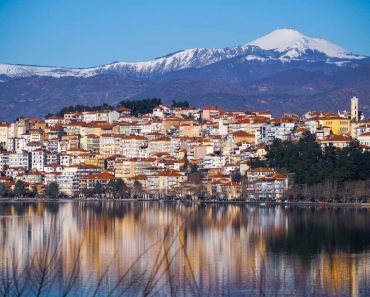
Shattered by grief, Sappho leapt from the cliff to certain death over the unrequited love of a beautiful young sailor.
So goes the legend of the ancient lesbian poet of Lefkada, a ‘hidden gem’ island off the west coast of Greece. Nicknamed the ‘Greek Caribbean’ for its iridescent ocean and superstar beaches, Lefkada’s mythic past tells of tragic figures throughout the ages who threw themselves from the rugged heights to the depths of the sea.
These tales have been rejected by historians, but their romantic allure still adds mystique to the lush green hills and lunar white sands that make Lefkada the most unique – and perhaps most unspoiled – of the seven jewels known as the Ionian islands.
Blissfully untouched by commercialisation, Lefkada is a quiet slice of paradise that remains under the radar for British tourists. I fell for its charm three summers ago, wandering past whitewashed villas with sky-blue rooves to the shore of Agios Nikitas, a tiny fishing village where the water has an otherworldly quality. Bombshell beaches like Kathisma and Egremini on the island’s west coast are virtually empty during the shoulder seasons — I’ve returned to Lefkada in the quieter months of March and September, and loved it just the same. And if the latest travel trends are anything to go by, I could soon have more company.

In September, Greece announced plans to impose a €20 levy on cruise ship visitors to the islands of Santorini and Mykonos during peak summer season, in a bid to avert overtourism. As rules like these sweep Europe’s traditional hotspots, the popularity of lesser-known destinations like Lefkada – or Lefkas, as the Greeks call it – is only going to soar.
Getting to Lefkada: A unique journey
Lefkada is the only Greek island you can reach by car. Flanked by olive trees and willowy cypresses, a half-hour drive takes you off the mainland via a causeway from Preveza airport, which is served daily by budget airlines including Ryanair and easyJet from April to October.
During winter months, the easiest route is to fly direct to Athens, then take a €40 bus to the island which takes between four and five hours.


Jet2 recently announced plans to launch direct flights from Newcastle to Preveza in 2026, a sure sign that Lefkada is a destination to watch.
Lefkada is small — at just 35km long, it takes about 2.5 hours to drive the perimeter on well-paved roads with decent signage. Sleepy traditional villages break up the journey, a sort of ‘land that time forgot’ where locals spend hours sipping strong coffee on the veranda.
Bakeries here are unfettered by tourist prices, with authentic pastries such as spanokopita (spinach and feta pie) and kourabiedes (Greek butter cookies) for less than €2.
Even better value are Lefkada’s off-beat tavernas, which serve moreish plates of saganaki (fried cheese with honey), calamari, mussels and grilled octopus with glasses of chilled red wine for as little as €16 a head.
Secret beaches
Mountains dotted with dense forest tower over the capital of Lefkada town, which has all the standard fare of a Mediterranean tourist trap (think ice cream parlours, dinky boutiques and a string of canal-side bars, perfect for sunset cocktails).
But beyond the souvenir shops are some of Greece’s most breathtaking beaches; Porto Katsiki and Milos regularly rank in Lonely Planet’s top 10.
However locals like Viktor, a 21-year-old DJ who grew up on the island, say you won’t find the best in a tourist guide. He says nothing compares to Kalamitsi, a coastal village surrounded by four beaches: Gaidaros, Kavalikefta, Vrachos and Avali, the most beautiful but most difficult to reach, set against a backdrop of majestic limestone cliffs.
Viktor also recommends a secret beach between famous Milos and Agios Nikitas, known for nudism.


Off the beaten track
Thanks to mild, rainy winters, Lefkada is surprisingly green compared to the dusty vistas of the more popular Cyclades islands like Santorini.
Hiking in the hills is both popular and challenging, but the effort is rewarded with spectacular views, especially if you combine your trek with dinner and drinks at glamorous hillside bars such as Amente or Utopia.
(A word of warning: book well in advance and pack a change of clothes, as there’s a strict dress code in Lefkada’s luxury establishments.)

The island’s unique weather conditions attract adrenaline junkies, too. Most head straight for Vasiliki, a long stretch of sand famed for world-class windsurfing and kiteboarding. International competitions are regularly held there thanks to reliable year-round breezes.
Day trips are best taken from the tourist town of Nydri, which also boasts the small but highly Instagrammable Dimossari waterfall on its outskirts. Boat hire on Lefkada is cheap, at around £90 for a canopy craft big enough to carry six people. Arguably the most popular jaunt is luxurious Meganisi, a celebrity magnet untouched by largescale development.
Its closest neighbour is Skorpios, a mysterious island that was once the private paradise retreat of Aristotle Onassis.
But why leave when Lefkada has so much to offer? This island is Greece’s best-kept travel secret. Go, but keep it to yourself.
Where to stay
For your first visit to Lefkada, it’s best to use Lekfada town as a base.
BOEM Boutique Hotel is a solid choice for location and value, with comfortable rooms just off the main strip for £72 a night. For a little more luxury, try The Secret Boutique Hotel, which has five uniquely designed rooms tucked down an alley (from £106).
A short drive from the capital, Sappho Boutique Suites is a popular choice for travellers in search of stunning scenery. All eight rooms offer views across the Ionian Sea, with prices starting from £111.
Airbnb and Booking.com also have plenty of apartments across the island, with some real gems tucked in the hills around Agios Nikitas.
MORE: The Eurostar alternative with £8 tickets – but the journey takes twice as long
MORE: The UK’s highest train station at 1,300ft has some surprising star power
MORE: The surprising holiday trend that could give Lapland a headache in 2025







